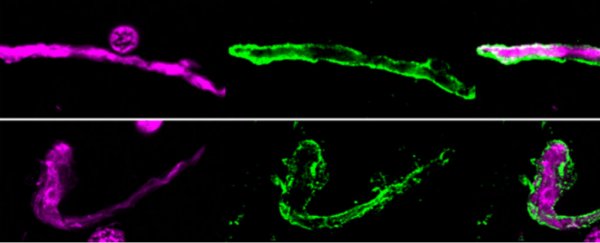A simple brain fungus could be behind some forms of Alzheimer's, a controversial new study suggests, after the same type of fungal infection was found in brains affected by the degenerative disease. While the results are intriguing, and anti-fungal treatments are now being explored, critics are saying it's too soon to tell if this could be one of possibly many underlying causes of Alzheimer's.
"The possibility that AD [Alzheimer's Disease] is a fungal disease, or that fungal infection is a risk factor for the disease, opens new perspectives for effective therapy for these patients," concludes the report, published in Scientific Reports. "The slow progression of the disease fits well with the chronic nature of fungal infections if they remain untreated. Moreover, inflammation and activation of the immune system may be due to an infectious fungal agent."
A team of molecular biologists led by Luis Carrasco from the University of Madrid in Spain examined the brains of 25 cadavers, 14 of which had the degenerative disease. All 14 brains were found to have the same fungus, whereas the other 11 healthy brains showed no trace of it at all. Even with such a small sample size, that's a strong correlation, and the team is trying to figure out what it means.
At this stage, it's not clear whether the fungus could be causing the disease or vice versa - but it has the potential to give doctors a clear target for treatment. There are already many anti-fungal drug treatments available for various conditions, and one of these could be adapted in order to treat or slow down the progression of Alzheimer's.
Scientists have already come to understand how misshapen proteins can kill off nerve cells in the brain, creating pockets of dead tissue that are responsible for the effects of Alzheimer's. Whether these rogue proteins are just a natural consequence of getting older, or whether there's some external cause remains to be seen, and the body of research amassed so far has yet to conclude the matter one way or the other.
As other researchers have pointed out, it seems unlikely that the fungus explanation is behind all cases of dementia - previous studies have found hereditary links, suggesting that a gene defect, rather than something external, is to blame. As The Economist explains:
"John Hardy, a neuroscientist at University College, London, points out that one (albeit rare) cause of Alzheimer's is well-understood. In a few unlucky families the disease appears to be an inherited disorder, caused by mutations of one of three genes. If a fungal infection were the ultimate cause, then those genetic mutations would have to make their carriers so susceptible that 100 percent of them end up infected - something he believes is unlikely. And the very clarity of Carrasco's result also makes Hardy suspicious.
If that result is right, though, it is still possible that the correlation runs the other way, with Alzheimer's opening the brain to fungal infection."
It's hoped that further research will identify the influence - if any - of fungal infection on the development of Alzheimer's. Carrasco's team now wants to trial anti-fungal drugs to see if they have an effect on the onset of the disease in living organisms.
